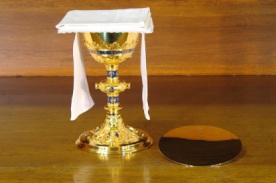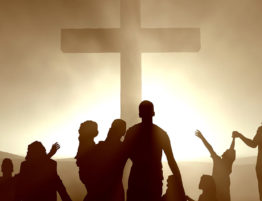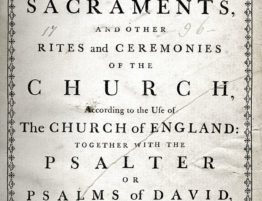
I trust that everyone had a blessed Thanksgiving Day with a happy feast and lots of leftovers! As I mentioned Wednesday night, I love that our parish custom has been to begin our Thanksgiving celebrations with the Eucharist, the Great Thanksgiving, on Wednesday night. Because it always falls at the end of November, Thanksgiving Day is usually just after or just before the Sunday Next Before Advent, which also has some themes related to feasting.
On a folk level, not-at-all related to the liturgy itself, is the colloquial name for this Sunday going back to English folk customs of referring to this as “Stir-up” Sunday. This title comes from our Collect, where we prayed:
Stir up, we beseech thee, O Lord, the wills of thy faithful people; that they, plenteously bringing forth the fruit of good works, may by the be plenteously rewarded; through Jesus Christ our Lord. Amen.
As we prepare for Advent, it is good to remember that as Christians our wills have indeed been freed from bondage to sin, so that our choices will indeed result in good works to God’s honor and glory. But this was also a reminder to our English forbearers to start “stirring up” the traditional Christmas pudding, which takes quite a long time to properly ferment. While I don’t know how many of you keep the traditional Christmas pudding, it’s good to remember that our Advent fasting ends in the great Feast of the Nativity.
Within our Gospel reading, St. John’s account of the Feeding of the Multitude, we also have a focus on feasting. Interestingly, this is not the first time we’ve read this passage for Sunday Communion this year. Back on the 4th Sunday in Lent, we read also read the beginning of John 6 as part of the Sunday of Refreshment. At that point, the story was a reminder that the Lenten fast is halfway over, and we have Easter to look forward to. Today’s use of that passage does the same as we head into Advent. In advent we fast as people in exile, mourning the sins of this fallen world. But we remember that the King is coming again, just has he came the first time. After we fast, we will feast, commemorating his first coming, and anticipating his second.
In traditional iconography and symbolic art, St. John’s account of the Gospel is represented by the flying eagle of Revelation 4. This is because John’s Gospel is the most theological of the four. His is the one that soars to the heights of thought. We therefore often have several layers of meaning in the text. In today’s passage from John 6, we can see three levels of feasting, three ways that the Lord Jesus feeds us.
John 6:5, (page 225 in the Prayer Book):
When Jesus then lifted up his eyes, and saw a great company come unto him, he saith unto Philip, Whence shall we buy bread, that these may eat? And this he said to prove him: for he himself knew what he would do. Philip answered him, Two hundred pennyworth of bread is not sufficient for them, that everyone one of them may take a little. One of his disciples, Andrew, Simon Peter’s brother, saith unto him, There is a lad here, which hath five barley loaves, and two small fishes: but what are they among so many? And Jesus said, Make the men sit down. Now there was much grass in the place. So the men sat down, in number about five thousand. And Jesus took the loaves; and when he had given thanks, he distributed to the disciples, and the disciples to them that were set down; and likewise of the fishes as much as they would. When they were filled, he said unto his disciples, Gather up the fragments of the five barley loaves, which remained over and above unto them that had eaten. Then those men, when they had seen the miracle that Jesus did, said, This is of a truth that prophet that should come into the world.
First, we have the feeding of the 5,000 itself. This is the most obvious level of feasting, the plain meaning of the text. The people are hungry, and there is not enough money to buy food to feed them. Indeed, with 5,000 men, not including women and children, Jesus’ small band would have had a logistical nightmare doing so even if they had the money! But we know the end of the story: Jesus miraculously feeds the multitude with the five loaves and two fishes. Jesus provides for the hungry people.
On the basic level, this is a reminder, that Jesus does indeed provide for us. He does indeed take care of us. In our Gospel for Thanksgiving Day, we read the famous portion from the Sermon on the Mount, where Jesus reminds us that God feeds the sparrows and clothes the wildflowers; how much more does God provide for us, whom he loves so much that he sent his Son to die for us? Does not the creator of the universe have the power to take care of his people?
St. Augustine writes:
[Jesus] therefore created as God creates. For, just as he multiplies the produce of the fields from a few grains, from that same source of power he multiplied in his hands the five loaves. There was power, indeed, in the hands of Christ. And those five loaves were like seeds, not indeed committed to the earth, but multiplied by him who made the earth.
We can therefore trust God in our provision. We all know that prices have been up. Everyone is feeling the economic squeeze. Yet we can still trust God. Most everyone I know can attest that when a financial windfall happens, it’s often just before an unexpected expense. I recall the time that I received a large honorarium for a funeral. My car broke down at the graveyard, not 10 minutes after I had been handed the check. And, wouldn’t you know it? The cost to repair was almost exactly the amount of that honorarium! It’s almost like God was providing exactly what I’d need.
The great 4th century poet, St. Ephrem the Syrian observes:
[Jesus] did not multiply the bread in accordance with his power to multiply it, but in accordance with what was sufficient for those eating it. His miracle therefore was not measured in accordance with his his power, but was measured rather in accordance with the hunger of those who were hungry.
We can indeed trust our Lord to provide our needs, one way or another. As we read Wednesday night, “But seek ye first the kingdom of God and his righteousness; and all these things shall be added unto you. Be not therefore anxious for the morrow: for the morrow shall take thought for the things of itself. Sufficient unto the day is the evil thereof.”
The second level of feasting in today’s Gospel reading is the feeding on God’s Word. Among both the Fathers and the Reformers it is common to see a parallel between the kinds of food in our Gospel and the kinds of Scripture. Take, for example, this writing from St. Cyril of Alexandria:
The five barley loaves signify the five Books of Moses, that is, the whole law which gives as it were a courser type of food.… But the fish signify the good food attained through the fishermen, that is, the more delicate books of Christ’s disciples. Within the latter, there are two distinct types, the preaching of the apostles and the proclamation of the evangelists, which shine forth among us.
Similarly, St. Augustine, commenting on how barley has a tough husk and a soft kernel, notes that the Old Testament contains a difficult exterior in the demands of the Law, but a delicious core of moral principles and pictures of Christ. Concluding, he writes, “For those things that it was carrying, when kept shut, were a burden, but when opened, were food.
So, we see Jesus feeding his people super-abundantly on both the Old and New Testaments. Just as the people were hungry for food, so are we hungry for the Word of God. We need to hear from the Lord in the entirety of his Word. Later on in John 6, our Lord compares himself to the manna in the wilderness. I’m reminded of Moses pointing to the reason behind the manna: “that [God] might make thee know that man doth not live by bread only, but by every word that proceedeth out of the mouth of the LORD doth man live.” Jesus, of course, quoted this very verse when the Devil tempts him after our Lord’s 40-day fast in the wilderness. As important as food, clothing, and the other necessities of life are, what we need most of all is to hear from God in his Word.
At the end of our reading, after Jesus has distributed the five loaves and two fish so that the entire multitude was fed, the disciples gather up twelve baskets full of leftovers. Many commentators throughout the centuries have seen the twelve baskets as representing the twelve disciples, who in turn represent the Church. This is both distributed by the Church and gathered by the Church. It is through the Apostles’ teaching continued in the Church that we are given God’s Word. It is the Church that gathers together God’s people and feeds them spiritually. This is why we’re here. May we never forget that we are here to administer the Word and the Sacrament, for God’s glory, the spread of his kingdom, and the strengthening of his people.
This, then, brings us to the third feast, the third way that Jesus feeds us as illustrated in today’s Gospel: The Sacrament of his body and blood. To really see this aspect of the story, we need to go forward a bit in the chapter. In fact, this passage was in our alternate Morning Prayer reading for Thanksgiving Day. John 6:30:
They said therefore unto him, What sign shewest thou then, that we may see, and believe thee? What dost thou work? Our fathers did eat manna in the desert; as it is written, He gave them bread from heaven to eat.
Then Jesus said unto them, Verily, verily, I say unto you, Moses gave you not that bread from heaven; but my Father giveth you the true bread from heaven. For the bread of God is he which cometh down from heaven, and giveth life unto the world.
Then said they unto him, Lord, evermore give us this bread. And Jesus said unto them, I am the bread of life: he that cometh to me shall never hunger; and he that believeth in me shall never thirst.
Skipping down to verse 48:
I am that bread of life. Your fathers did eat manna in the wilderness, and are dead. This is the bread which cometh down from heaven that a man may eat thereof, and not die. I am the living bread which came down from heaven: if any man eat of this bread, he shall live forever: and the bread that I will give is my flesh, which I will give for the life of the world.
This is indeed pretty explicit Eucharistic language. Throughout the Old and New Testaments we see hints at the Sacrament of the Table; here is something much more clear. In the Sacrament, Jesus feeds us with himself. And the feeding of the multitude was to point to that truth later unpacked in the same chapter of John’s Gospel.
And here we see a progression. We are fed with food. We are fed with God’s Word in the Scriptures. We are fed by God’s Word-made Flesh, who is indeed God himself. With apologies to students of Abraham Maslow and developmental psychology, here we see St. John’s account of the Gospel’s hierarchy of needs. We see what we need most is fellowship with God himself.
St. John Chrysostom writes:
I fed your bodies, he says, so that after this you. Might seek that other food that endures, which nourishes the soul. But you run right back to that food that is temporal. Therefore you do not understand that I led you not to this imperfect food but to that which mouthed not the body but the soul.
He continues later:
They still thought that [the bread] was something material, and they yet expected to satisfy their appetites, and so they quickly ran to him. And what does Christ do? Leading them little by little, he says, “The bread of God is he who comes down from heaven and gives life to the world.”
So here we have the ultimate feast: feeding on our Lord himself. God’s provision is good. He takes care of us because he loves us. But he takes care of us on even deeper levels by feeding us with his Word and ultimately with his Son. As we move towards our Sacramental feast, Let’s close with an ancient prayer found in the Didache:
We give you thanks, our Father, for the life and knowledge which you have made known to us through Jesus, your servant; to you be the glory forever. Just as this broken bread was scattered upon the mountain and then was gathered together and became one, so may your church be gathered together from the ends of the earth into your kingdom; for yours is the glory and the power through Jesus Christ forever.
In the Name of the Father, and of the Son, and of the Holy Ghost. Amen.




